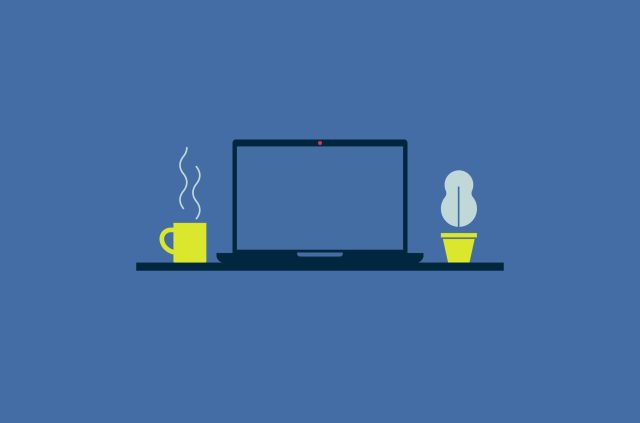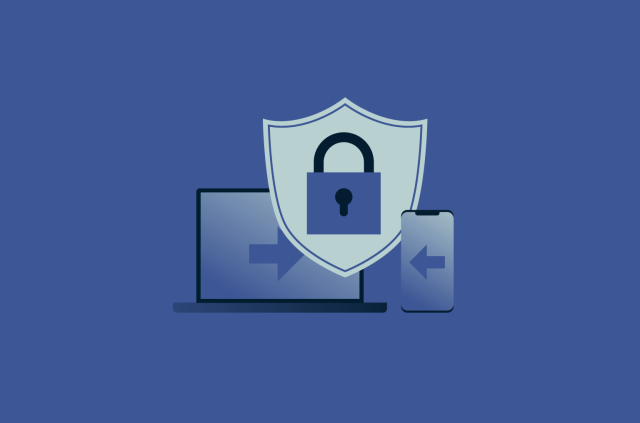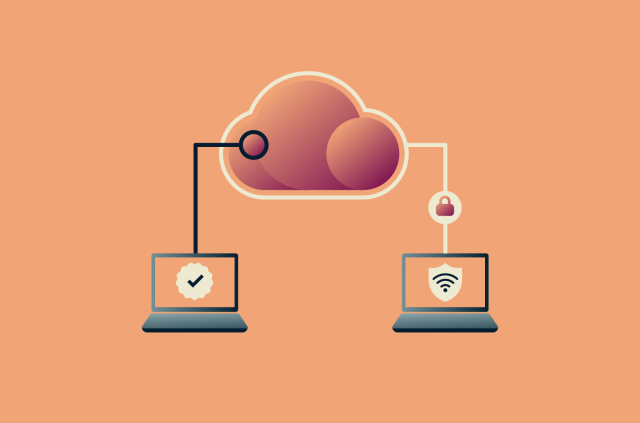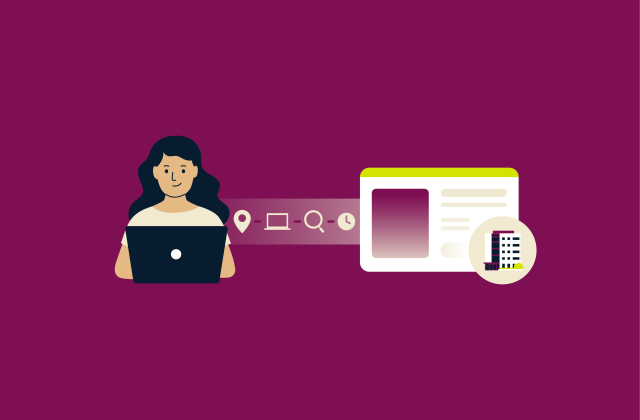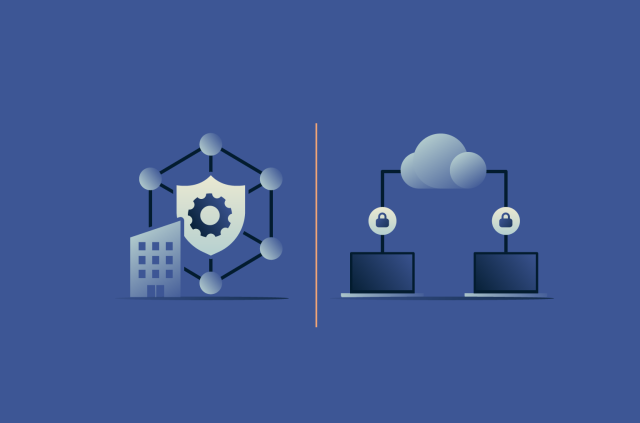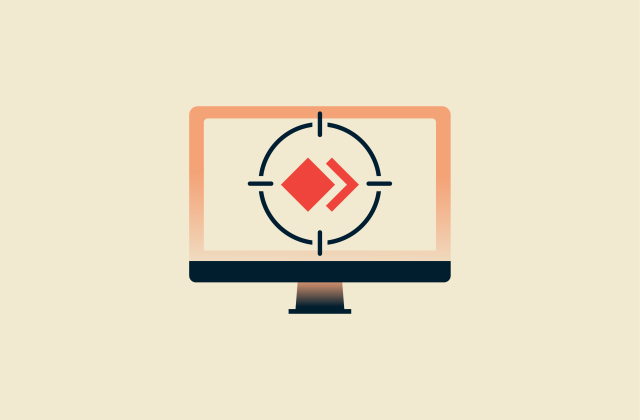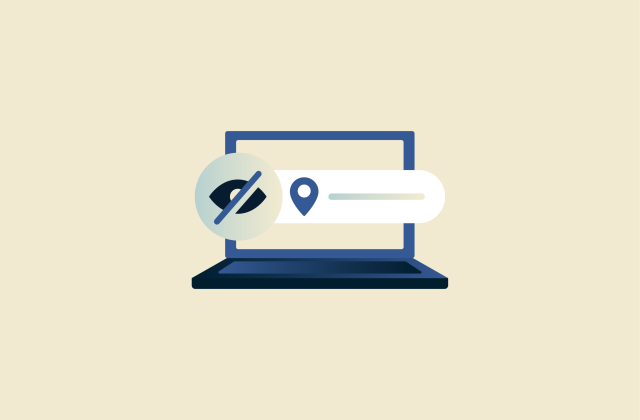Should you use a VPN at work? A practical guide
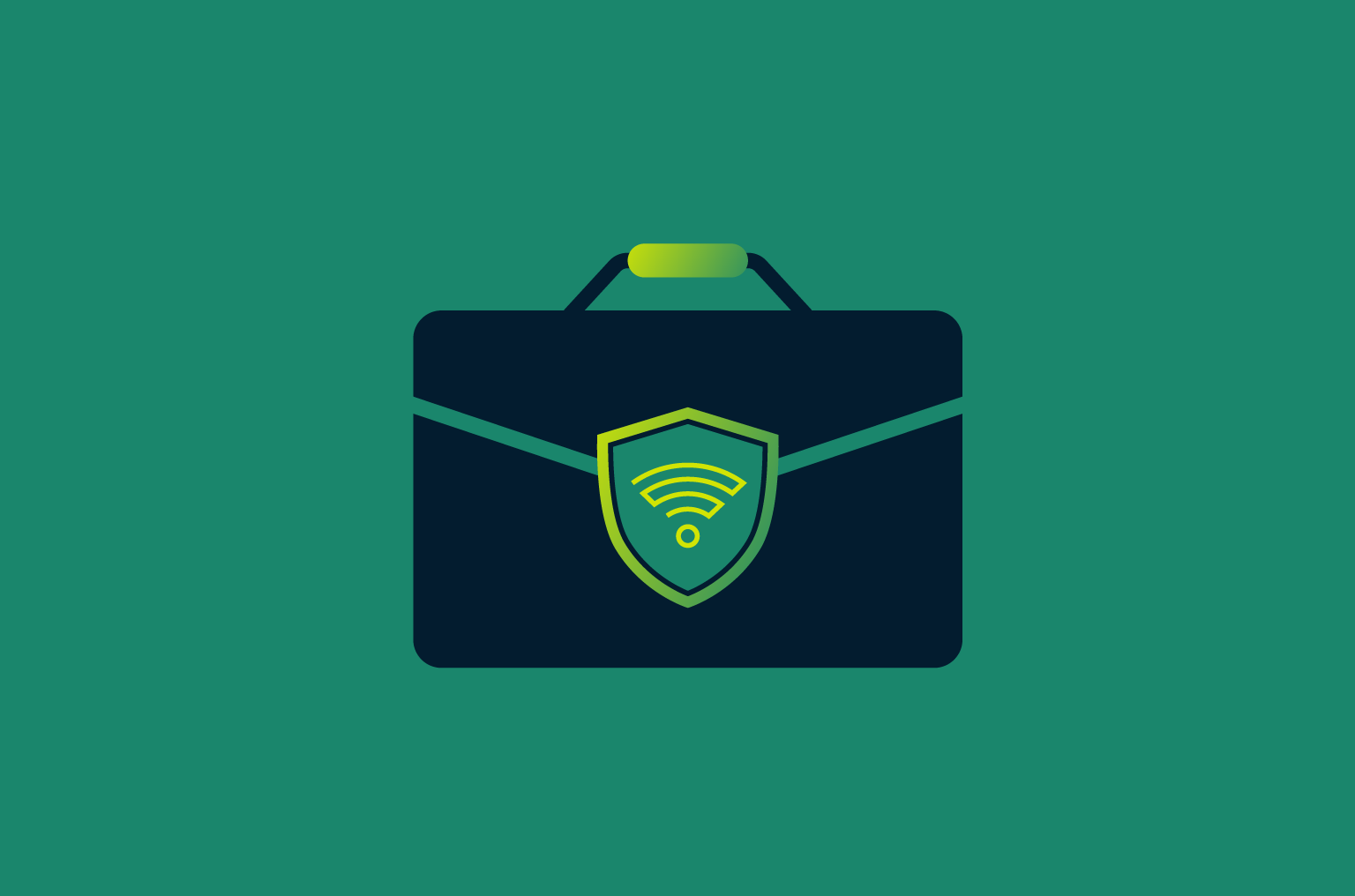
Whether you work from an office, a coworking space, or your living room, your internet connection is likely at the center of everything you do. A virtual private network (VPN) can help keep that connection secure, but how it fits into your work depends on who you are and what you do.
From freelancers protecting their data to companies safeguarding internal systems, VPNs play different roles in the modern workplace. This guide looks at how they’re used in professional settings, when they make sense, and what to consider before turning one on.
Types of VPNs
VPN software generally falls into two main categories: personal VPNs and business VPNs. Each serves a different purpose and works in different ways, but both play a role in keeping your work secure.
Personal VPNs are services you subscribe to and install on your own device. They encrypt your internet connection and mask your IP address, keeping your online activity private from cybercriminals and internet service providers (ISPs) and your identity protected from the websites you visit.
These VPNs are well-suited for personal privacy but can also be useful for work, especially for freelancers, remote professionals, or small business owners who rely on unsecured networks or handle sensitive information.
Business VPNs, on the other hand, are managed by companies to secure connections to internal systems, servers, and applications. They’re typically required on company-owned devices but can also be installed on personal devices under bring-your-own-device (BYOD) policies.
Access and settings of business VPNs are controlled by IT administrators. They focus on protecting corporate data and controlling access to company resources rather than ensuring personal privacy.
| Personal VPN | Business VPN | |
| Designed for | Individuals, freelancers, or small teams who want to protect their own data and privacy | Organizations that need to secure access to internal systems and company data |
| Connection | Routes traffic through a remote server operated by the VPN provider to protect online privacy and mask your IP address | Connects directly to a company’s private network or cloud infrastructure, creating a secure channel for work data |
| Use case | Protects personal information on public Wi-Fi and enables safe remote work and access to work content from anywhere | Lets employees securely access corporate resources, collaborate remotely, and meet data-protection or compliance requirements |
| Control | Managed by the user; settings, server choice, and activity logs (if any) depend on the VPN provider | Managed by the company’s IT team, with centralized control over access, permissions, and monitoring |
| Security level | Strong encryption focused on individual privacy and general online safety | Enterprise-grade security designed to protect business assets and sensitive information |
| Device management | Installed and maintained by the user on personal or work devices | Installed on company-managed devices or, in BYOD setups, on personal devices that connect to the corporate network |
| Privacy focus | Shields your activity from ISPs, advertisers, and public networks | Secures company data but may allow monitoring of employee activity within the business network |
Using a personal VPN for business
Freelancers, small business owners, and remote professionals often handle sensitive data or connect through different networks, including public and unsecured ones. In these cases, a personal VPN like ExpressVPN can help protect your data, maintain privacy, and support remote work.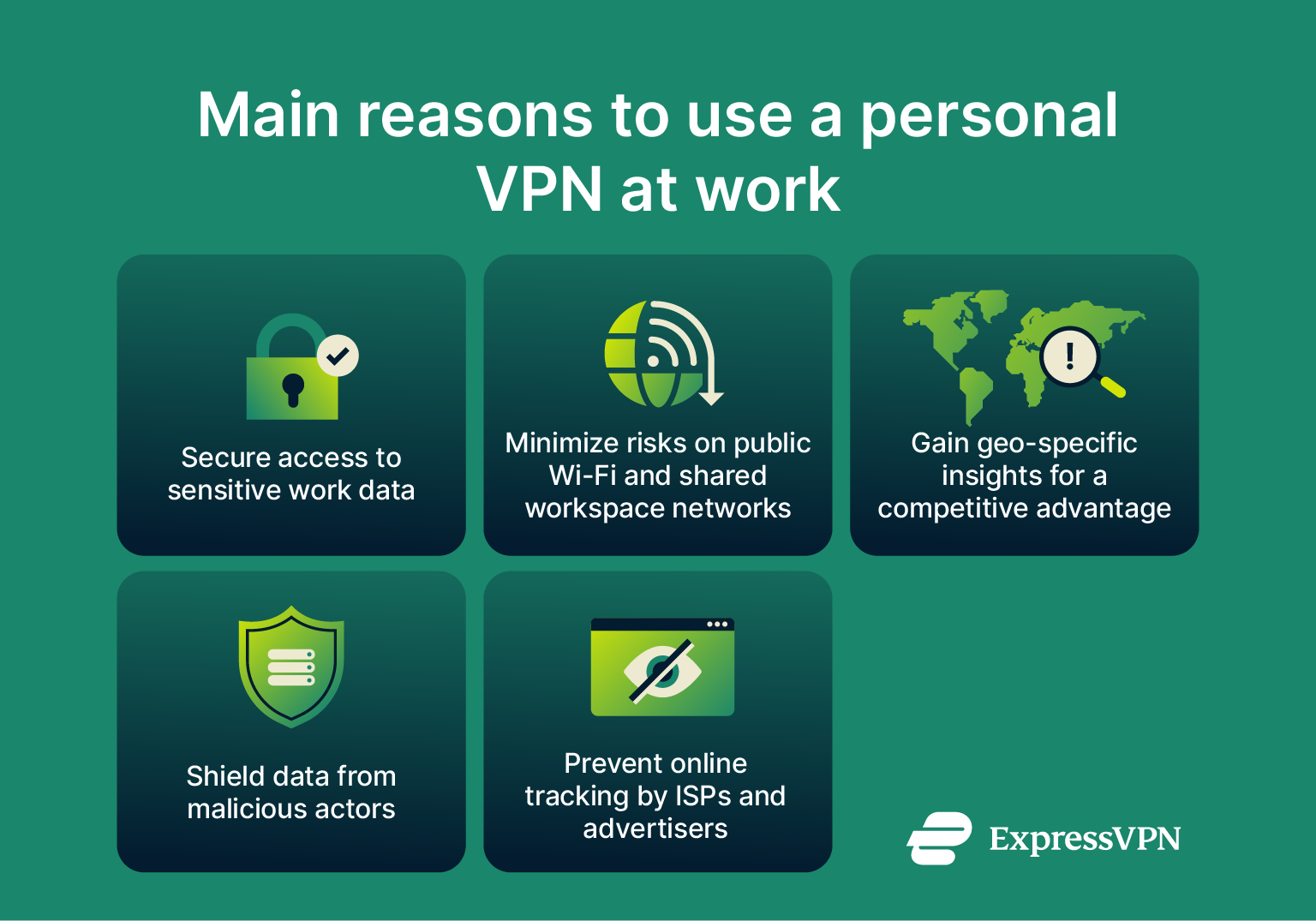
Increase your general privacy and security
A personal VPN creates an encrypted tunnel between your device and the internet, keeping your connection private and secure. All your online activity, whether sending emails, accessing shared drives, or managing client dashboards, is shielded from outside view. Even if someone intercepts your traffic, the data appears as scrambled code that can’t be read or misused.
This protection goes beyond privacy. It prevents ISPs, advertisers, or anyone on the same network from tracking your activity. When working with confidential projects or handling client information, this helps ensure your data stays protected, and your digital footprint is minimized.
Stay safe in public or coworking spaces
Public Wi-Fi networks, whether in cafés, libraries, or coworking spaces, are convenient for freelancers but rarely secure. Shared connections make it easier for attackers to intercept data, monitor traffic, or exploit unsecured devices. Even something as simple as checking your email or logging into a shared workspace can expose sensitive information if the connection isn’t encrypted.
Coworking environments carry an added risk: dozens of professionals connect to the same network infrastructure. Without strong isolation measures, someone could scan for open ports, capture unprotected data, or carry out man-in-the-middle (MITM) attacks, where traffic is secretly intercepted or redirected to fake websites that steal credentials.
When working from shared spaces, a VPN helps secure business communications, protect client data, and keep your work private on public networks.
Access content you need for work from anywhere
Marketers, content creators, and remote professionals often need to see geo-specific search results, ads, or content for research, testing, and monitoring.
A personal VPN allows you to connect through servers in other countries, helping you view content and analytics as if you were there. Beyond convenience, this gives businesses and freelancers a competitive advantage, offering deeper insights into regional markets, advertising performance, and audience behavior.
How to choose a VPN for your small business
Small offices and growing businesses need a reliable way to secure their online operations without adding IT complexity.
Beyond the features important for personal use, such as strong encryption, fast speeds, and responsive customer support, a VPN for small businesses should also offer centralized management. This lets you add or remove users and assign licenses from a single dashboard. As your business grows, volume licensing makes it easy to scale protection across your entire team.
If your team works on shared networks, consider portable routers with built-in VPN support, such as Aircove Go. They create encrypted connections for every device on the network, extending protection to equipment that doesn’t support VPN apps, like smart TVs or shared office hardware.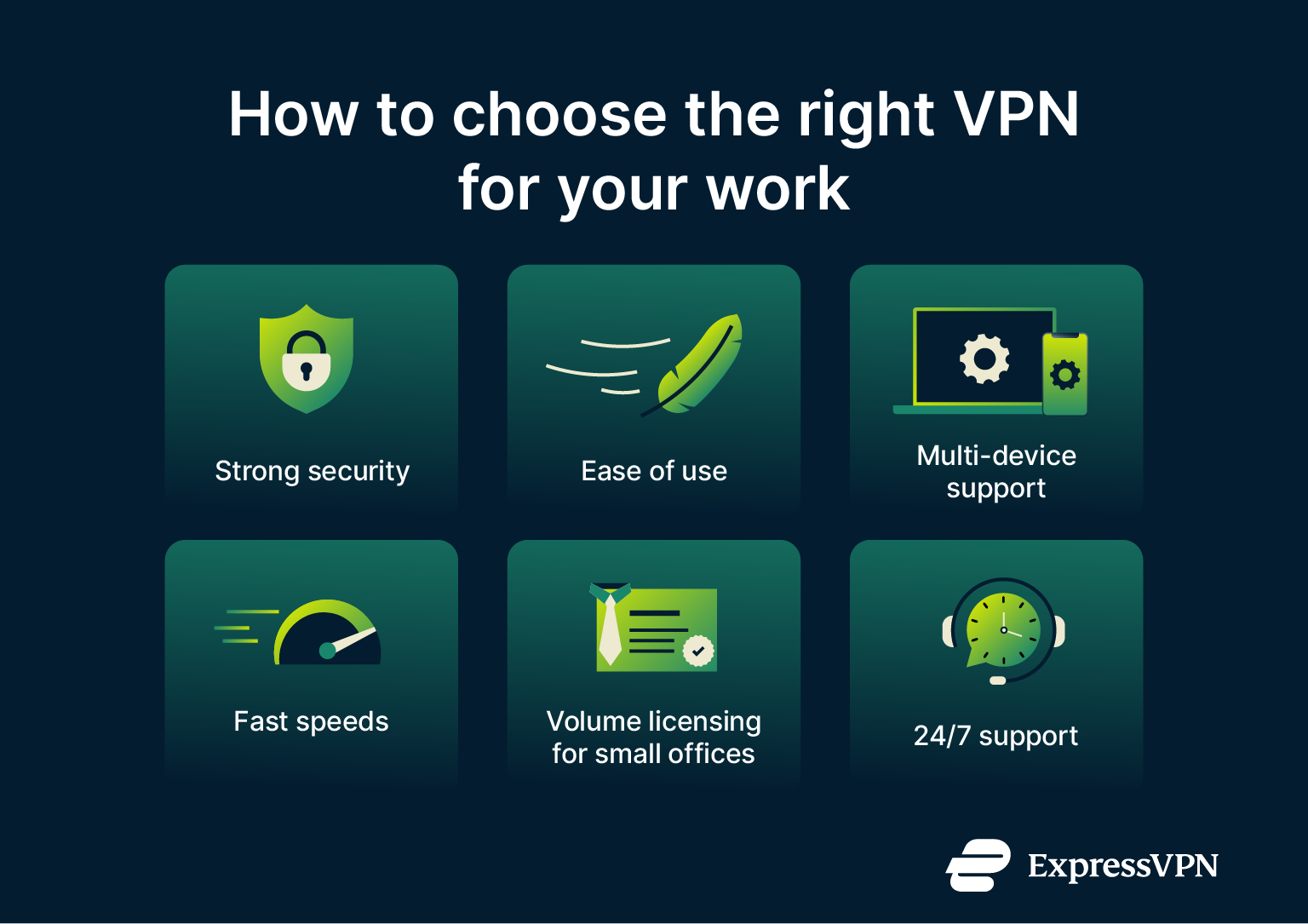
When not to use a personal VPN for work
While personal VPNs can be helpful at work, there are situations where they aren’t the right choice either because they are ineffective or violate your employer’s policies (or both). Here’s when to avoid it and what to do instead.
On employer-provided devices
Using a personal VPN on employer-provided devices is usually not a good idea, as it might violate company policy and lead to disciplinary action.
Moreover, company devices often include endpoint monitoring or surveillance software, sometimes called bossware, that logs activity at the system level (keystrokes, screen captures, app use, domain visits, etc.), even before data leaves the device.
Because such monitoring operates before or alongside the corporate VPN may not hide your activity and might conflict with your company’s security controls or policies. Instead, keep your personal browsing to your own device (such as your smartphone) and use work devices strictly for business tasks.
For bypassing network restrictions
Some networks block certain websites or services for security or productivity reasons. Using a personal VPN to get around these restrictions can break workplace rules. If a restriction prevents you from accessing resources you need for work, ask your IT department for proper access instead of trying to bypass it yourself.
For remote access to company resources
Personal VPNs aren’t designed to connect to your company’s private network. Trying to use one could cause errors, prevent access, or even compromise security. For accessing files, servers, or applications remotely, you should use your company’s remote-access VPN, which is specifically configured for this purpose.
Learn more: If you want to know more details about remote access to company resources, read our guide on RDP vs. VPN.
Using a business VPN
A business VPN creates a private, encrypted network that connects employees to company systems over the internet. It works as a secure gateway to internal tools, databases, and cloud resources, ensuring that only verified users can reach sensitive business data.
Depending on company setup, a business VPN can support remote employees, link multiple offices, or secure hybrid cloud environments, all without exposing internal assets to the public internet.
Types of business VPNs
Business VPNs vary depending on how they’re deployed and used. Deployment refers to where the VPN infrastructure is hosted, either in the cloud or on company hardware. Usage refers to how connections are made, either linking entire office networks or allowing individual employees to connect remotely.
Cloud-based vs. on-premise VPN solutions
A cloud-based VPN runs on servers hosted and maintained by an external provider, making it easier to deploy, manage, and scale. An on-premise VPN, by contrast, operates on a company’s own infrastructure, offering greater control and customization but requiring more in-house resources and technical expertise. Here are the main differences between these two approaches:
| Cloud-based VPNs | On-premise VPNs |
| Runs on secure servers managed by the VPN provider | Requires dedicated servers and infrastructure within the company’s facilities |
| No physical hardware or complex installations needed at the office | The organization owns and manages all hardware and software |
| Quick to deploy and easy for employees to access from anywhere with an internet connection | Provides greater control over security configurations and data |
| Reduces the need for a large in-house IT team | Requires specialized IT expertise and ongoing maintenance |
| Scalable and flexible, ideal for dynamic or remote workforces | Higher upfront costs and less scalable, but can offer better performance for internal mission-critical applications |
| Cost-effective due to lower management overhead | Requires more resources to manage internally |
Site-to-site vs. remote access VPNs
These categories describe how the VPN connects users and networks. A site-to-site VPN links entire office networks together, for example, headquarters and multiple branch locations. It establishes a permanent encrypted tunnel so that every device in one office can communicate with devices in another, as if they were all on the same local network.
This type of solution is complex to set up, requires significant IT management, and is typically reserved for larger organizations with multiple physical offices.
A remote access VPN is a more familiar setup for employees working from home or while traveling. In this model, an individual uses VPN client software to create an encrypted tunnel into the company’s private network. Once connected, they can securely access internal files, applications, and resources.
Remote access VPNs often use the Secure Sockets Layer (SSL) or Internet Protocol Security (IPsec) protocols and are generally easier to manage than site-to-site solutions. Still, they’re usually configured and monitored by an IT department to ensure compliance and security.
Corporate VPNs and employee privacy: What you should know
Corporate VPNs serve a very different purpose from consumer VPNs. Their goal isn’t to make employee activity private but to create a secure gateway for authorized users to access company systems, files, and applications.
When you connect through a corporate VPN, your traffic is encrypted so that sensitive business data stays protected as it travels across the internet. However, this encryption safeguards the company’s information, not your personal browsing.
Because the VPN connection passes through company-managed servers, IT administrators can still see network activity, such as which apps or sites are accessed, to monitor performance, enforce policies, and detect security threats. This means your online activity isn’t private, even if it’s encrypted.
If you’re using a corporate VPN on a work device, assume all traffic and actions could be logged for compliance or security reasons. To maintain personal privacy, use a trusted personal VPN on your own device and outside company-managed networks.
FAQ: Common questions about using a VPN at work
Can I use a personal VPN at work?
If you’re a freelancer or small business owner, using a personal VPN can be a smart way to protect client data, keep your research private, and stay secure on public Wi-Fi or shared networks. It helps safeguard sensitive files and communications, especially when working remotely or from coworking spaces.
However, if you’re using an employer-provided device, you generally shouldn’t install or use a personal VPN. Company laptops often have monitoring or endpoint security tools that track activity directly on the device, even before traffic reaches the VPN. Using your own VPN can violate company policy or interfere with corporate security systems. In that case, stick to the business VPN provided by your IT department for work access, and save your personal VPN for your own devices and networks.
Can my employer see what I do on a VPN?
If you’re connected to a corporate VPN, your employer can typically see your online activity. While the VPN encrypts your traffic to protect company data, that encryption doesn’t hide your actions from the company itself.
Since all traffic passes through servers managed by your employer, IT administrators can log which websites or apps you access, monitor activity for policy compliance, and detect security threats. For private browsing, use a personal VPN on your own device and network instead.
Can I use a free VPN at work?
Using a free VPN at work isn’t usually recommended. While some free VPNs offer solid protection, they often come with trade-offs like limited server choices and slower speeds due to network congestion.
For professional use, a reputable paid VPN service offers more reliable performance and security than most free options.
Does a VPN slow down my work connection?
Sometimes, but the difference is often minimal. Any slowdown is due to the extra step of encrypting and routing your traffic through a secure server. Choosing a nearby server location can help maintain faster speeds.
Can my employer track my location through a VPN?
If you’re using your personal computer with your own VPN, your employer can’t track your real location through that VPN connection. The VPN masks your IP address and replaces it with the VPN server’s location, so your physical location isn’t visible over the network.
However, if you’re on a company-managed device, your employer may still be able to see location or activity data through built-in monitoring tools, device management software, or internal network logs. In this case, the VPN connection is typically a corporate VPN, which is designed to protect company resources, not your personal privacy.
Does a VPN hide my search history from my employer?
If you’re using a corporate VPN, it won’t hide your browsing activity from your employer. Corporate VPNs are designed to protect company data, not to keep your personal activity private.
A personal VPN encrypts your internet traffic and hides the websites you visit from third parties. However, it doesn’t erase or hide your actual search history saved in your browser or search engine account. To fully remove that information, you’ll need to clear your browsing and search history through your browser settings.
Take the first step to protect yourself online. Try ExpressVPN risk-free.
Get ExpressVPN



